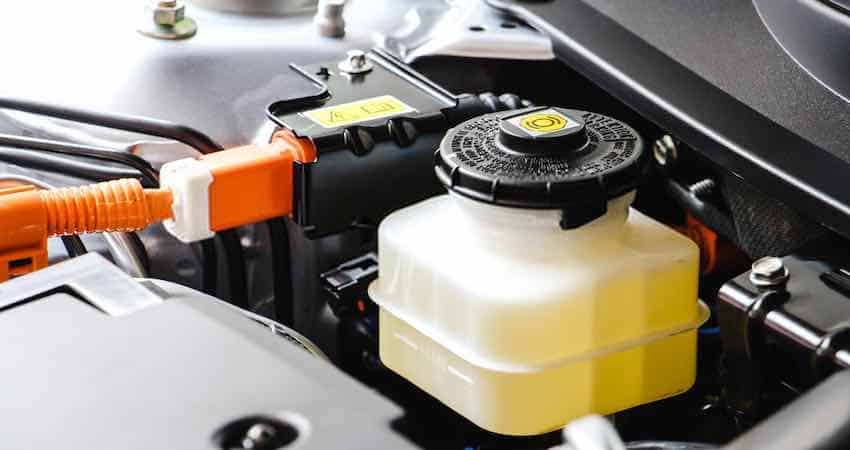Last Updated on September 12, 2023 by Pittalks
One question is expected in the auto mechanic industry or car owners whether brake fluid is flammable or not?
So, I must explain that brake fluid is flammable and will burn when exposed to high temperatures, making it a fire hazard. However, since it catches fire at a high temperature, it rarely becomes the fire hazard’s primary reason.
Therefore, to clarify why and how brake fluid is flammable, let’s dig out some details through this article.
Why brake fluid is flammable? How dangerous is it?
Brake fluid’s flammability is due to the different components present in the brake fluid. Therefore, there are several brake fluids with different flammability. Moreover, there are three models of brake fluid commonly in the market DOT3, DOT4, and DOT5. Out of which DOT3 and DOT 4 are glycol-based whereas, DOT5 is silicon-based. The ethyl-glycol-based brake fluid is flammable and catches fire quickly. In addition, silicon-based brake fluid is also flammable. But according to some reports, some brands promise non-flammable brake fluids.
I recommend checking out this video for an in-depth overview of the different kinds of brake fluid:
Brake fluid when burning is hazardous. However, due to low ignition capability when storing brake fluid, it may not be the primary source of fire. In case of accidents, brake fluid acts dangerously by burning and spreading it to rubber parts. Moreover, it is highly corrosive and toxic for your car as it eats the metal parts. In my experience, if you are using glycol-based brake fluid, it may peel off the paint of your vehicle when in contact.
Will brake fluid explode?
While brake fluid is a flammable substance (technically), it will not spontaneously explode. I would imagine that it can contribute to a fire hazard, but rarely would it be the primary factor. Since most cars these days use a sealed brake system, there would have to be a significant brake fluid leak at play.
When does brake fluid catch on fire?
Is brake fluid flammable, and if so, when does it catch fire? Brake fluid is flammable under high temperatures. When brake fluid absorbs heat it eventually crosses the flashpoint, then vaporizes and burns. However, different types of brake fluid have their different temperature on which it catches fire. Moreover, brake fluid will not catch fire under average temperature but ignite when the temperature rises 540-675 degrees Fahrenheit. Sometimes, brake fluid can start a fire on its own after spraying it on the heated hose at 1000 degrees Fahrenheit. In my opinion, DOT3 fluid is flammable more than other brake fluid but at a lower intensity. As a comparison, check out the table below:
| Brake Fluid Type | Flash Point (°C) | Ignition Temperature (°C) |
|---|---|---|
| DOT 3 | 205°C | 365°C |
| DOT 4 | 230°C | 400°C |
| DOT 5 | 260°C | 500°C |
| DOT 5.1 | 240°C | 480°C |
With that said, I must tell you that according to one experiment, glycol-based brake fluid ignites spontaneously at 390-400 degrees. If brake fluid splashes on the exhaust system during a collision, it will catch on fire. Thus, formed by burning brake fluid, the fireball spreads rapidly, burning off the plastics and cables.
Here’s a video of an experiment where brake fluid is exposed to a high temperature, high pressure, environment:
Can I mix brake fluid?
From my personal practice, I don’t recommend mixing brake fluid under any circumstances. There are some varieties that are compatible together but in some cases the brake fluid will solidify within the brake system which creates an inherently dangerous situation. Otherwise, the congealed, solidified, substance is increasingly flammable.
How to avoid brake fluid burns?
It is evident that brake fluid is relatively flammable and toxic. So, you should maintain safety precautions to avoid brake fluid burns. Thus, keep the following safeguards to ensure safety.
Resist brake fluid from fires and electric points.
Use gloves while working with brake fluid.
Clean your skin immediately as it gets on your skin
Always store brake fluid in its container with an air-tight cap. Make sure to keep it in a clean and dry area.
Do not reuse fluid and do not use fluid that is in contact with the air. Contaminated brake oil may react, causing a burn.
Avoid mixing up with other brake fluid. For example, if you use DOT5 brake fluid and then never mix DOT 3 or DOT4. This mix-up may cause corrosion and reaction.
Never use low DOT rating fluid, as it may cause brake fluid to boil and cause a burn.
Do not try to overfill the brake fluid reservoir. Instead, I recommend leaving space for expansion of the hydraulic fluid, avoiding slippage of fluid.
Do not spray cleaner around brake fluid. The brake cleaners contain chlorine solvents that react with brake oil and start burning.
Check for fluid leaks and fix them to avoid accidental burns.
Final words
Brake fluids play a crucial role in the braking system and power transfer. However, your question is that brake fluid can be flammable and catches fire as it is an ethyl-glycol derivative. But brake fluid rarely becomes the reason for fire or hazard. When the temperature rises above 400 degrees Fahrenheit, the fluid catches fire and burns itself. Moreover, brake fluid may catch fire when contacting an open fire source or heated element. Therefore, I would suggest you be careful while handling brake fluid and avoid burns.
Read more from the flammability series:
Is diesel flammable?
Is motor oil flammable?
Is power steering fluid flammable?
Is coolant flammable?
Is trans fluid flammable?
Is hydraulic fluid flammable?
Related FAQs
What is a flashpoint of brake fluid?
Flashpoint is the temperature where brake fluid vaporizes and may burn off. The flashpoint of brake fluid is 210-375 degrees Fahrenheit. Brake fluid has a high flashpoint, which means brake fluids flammable. It has flashpoints more than liquids like gasoline with flashpoint 40 degrees Fahrenheit value. However, the glycol-based DOT3 and DOT4 have lower flashpoints as compared to the silicon-based DOT5 flashpoint value.
How many types of brake fluid?
Brake fluids are mainly of four types as per the classification given by the U.S Department of Transportation (DOT). These are:
DOT3
DOT4
DOT5.1
Most fluids come under DOT3, DOT4, or DOT5.1. These brake fluids tend to absorb moisture from the air and, thus, keep it air-tight.
DOT3 is the standard brake fluid in the market, which is glycol-based and cheap brake fluid. On the other hand, DOT3, DOT4, and DOT 5.1 are glycol-base fluids, whereas DOT 5 is silicone-based fluid. The main difference between these is that DOT 3, DOT 4, and DOT 5.1 are water-absorbent. Whereas DOT 5 is not.
However, if you are using any of these hydraulic fluids, I recommend not using DOT 5 fluid in vehicles supporting DOT3 and DOT 4. Therefore, it is essential to read the manufacturer’s manual before choosing your brake fluid.
Is DOT 3 brake fluid flammable?
Yes, being glycol-based, this brake fluids flammable indeed. It is the most common brake fluid, which has a flashpoint of 230 degrees Fahrenheit. Thus, it quickly catches fire as compared to other brake fluids. In addition, the boiling point of this fluid is 250 degrees Celsius. Therefore, it has a rating of 1 and is classified as moderately flammable.
Is DOT 4 flammable?
Yes, DOT 4 brake fluid is also flammable. It is a polyglycol-based hydraulic brake fluid that is water-absorbent. Moreover, the flashpoint of this brake fluid is 210-375 degrees Fahrenheit, which means it may burn quickly at high temperatures. They burn sooner than the silicon-based brake fluid. When temperatures rise above 540-675 degrees Fahrenheit, DOT4 fluid burns itself.
Is Prestone brake fluid flammable?
Prestone brake fluid is a synthetic high-temperature fluid that lasts longer and provides ultimate safety. Thus, it is less flammable as compared to other standard DOT brake fluid. As a result, Prestone prevents overheating and fading of brakes. In addition, Prestone provides superior braking performance as compared to others. The company claims it to be non-flammable as it has a very high flashpoint temperature value.
What car fluids are flammable?
Your car releases lots of fluids that unintentionally burn off. There are many fluids such as engine coolant, windshield washer fluid, and automatic transmission fluid that may cause a fire in your car. Moreover, there have been many investigations and experiments to check which fluid is flammable and which is not. The test and studies suggest that motor oils, brake fluids, steering fluids, and coolants may also cause a fire in your car. However, there are nearly all fluids that catch fire under certain circumstances.
Is brake fluid toxic?
Yes, brake fluid is highly toxic. It should not be ingested, exposed to bare skin, or otherwise exposed to vulnerable places on the human body. When throwing away brake fluid, it is technically considered hazardous waste and should be disposed of at a certified waste handling facility.

